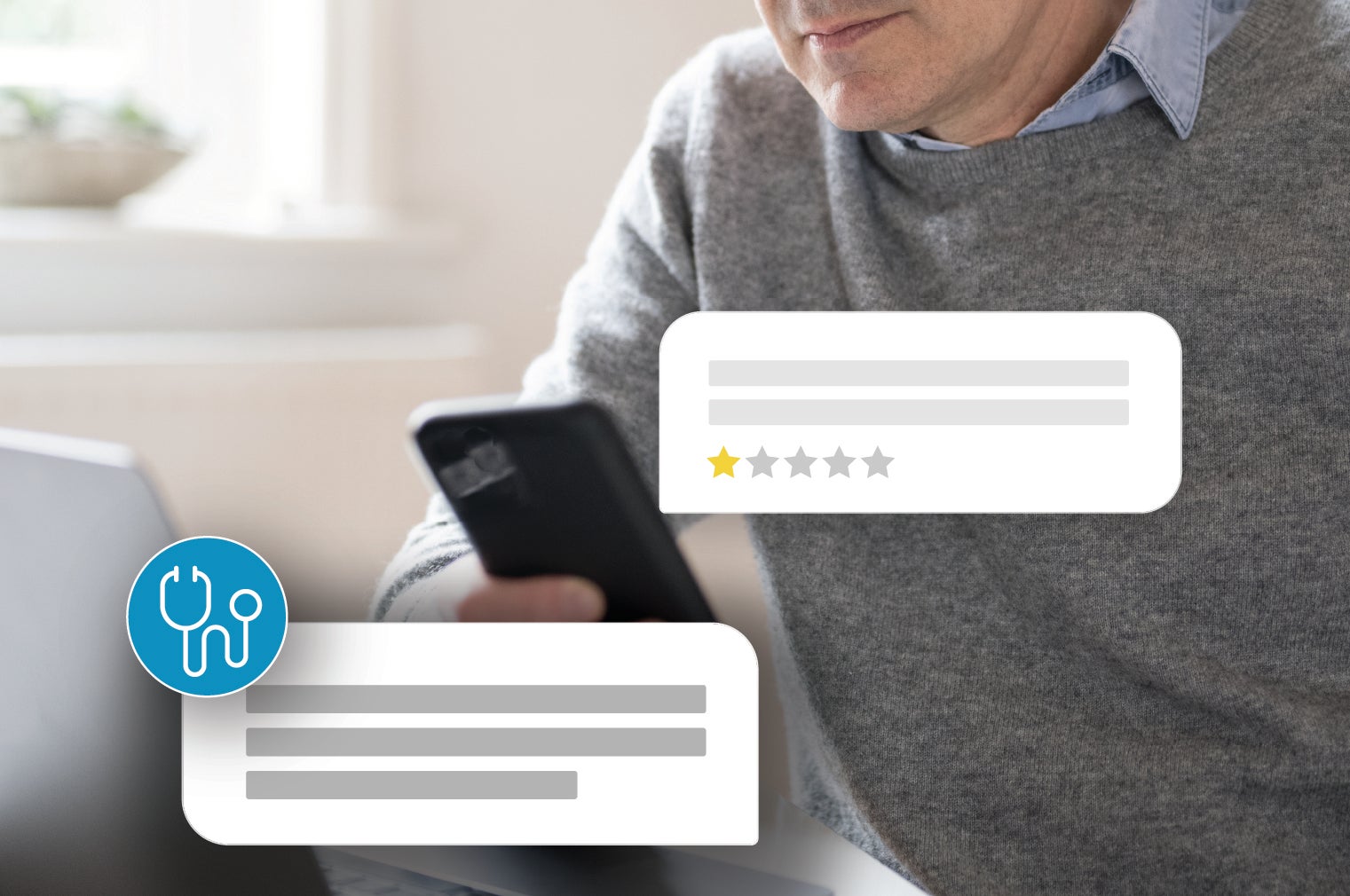Healthcare organizations need patient feedback to improve all aspects of their operations. Increasingly, that feedback is happening through ratings/reviews made on public forums such as Google, your website, and social media. According to Reputation research, 86% of patients say they read online reviews, and 60% read at least five reviews when researching providers. But not all of those reviews of your organization are going to be positive. No matter how committed you are to excellence, someone is going to criticize your organization in a public review. How should you handle those reviews? Let’s take a closer look in this post. The headline: don’t ignore negative reviews. Respond to them (but very carefully, as we’ll discuss below). And learn from them. After all, negative feedback can be the most important to help you improve.
Why Online Reviews Matter
Ratings/reviews fuel the growth of your healthcare organization. According to a Reputation survey of consumers, online feedback is consistently among the top three factors influencing a person’s choice of a physician or hospital, along with in-network insurance coverage and proximity. According to the 2023 Healthcare Reputation Report:
- 65% of consumers say they have selected one healthcare organization over another based on online ratings and reviews.
- 73% say a minimum star rating of 4 stars is needed for them to engage with a provider or physician.
- 39% of consumers say a positive experience prompted them to leave a review versus 24% that said they had a negative experience. Extremes of experience will prompt unsolicited reviews.
Reviews also help you improve, and this includes the negative ones. This is especially important at a time when the mentality of the industry is changing from patient volume to patient value. Amid the rise of value-based care, providers need to think about how they can attract and keep high-value patients. Managing feedback is the key. Leaders are engaging with customers across the customer journey, and that starts with new patient acquisition and continues through to return of loyal patients. Doing this achieves benefits ranging from improving retention rates to driving referrals.
How to Respond to Negative Healthcare Reviews
No one is perfect. And sometimes patients will let you know about it when your organization falls short. And there are times when a patient leaves a flaming review that might seem “unfair.” Perhaps the patient is upset about something that is beyond your control. Perhaps they are reacting to inaccurate assumptions, or they are making what seems to you unreasonable expectations. Whatever the reason, a patient who takes the time to leave a negative review is likely reacting to something very stressful and possibly traumatic if they’re dealing with a difficult healthcare experience. It’s always good to remember this reality: when patients leave you feedback, they’re providing you with insight into how they perceive their experience and how that experience makes them feel. All feedback is valuable in that regard. So, how to respond when negative feedback happens? Here are some tips:
- Make sure all stakeholders are aligned with a strategy and escalation process. Before you respond to any review (negative or positive), you must set yourself up for success by getting various departments on board with a strategy for responding to negative reviews. The time to ask, “How do we handle criticism?” isn’t when it happens. You should have a policy and strategy understood early on. Stakeholders should include marketing/communications, patient experience, operational, and legal teams. Don’t forget that your customer success manager can help you put together a strategy to address any specific concerns.
- Remain HIPAA-compliant when responding to patient reviews. We cannot stress this enough: your approach must be HIPAA compliant. For example, if a review from a patient includes protected health information (PHI), never disclose additional PHI in your response. Also, never acknowledge the reviewer’s patient status. It’s tempting to respond to a negative review with an empathetic remark such as “We are sorry you had a bad experience with us.” Doing so would acknowledge that the reviewer has received care at your organization, which could violate HIPAA regulations.
- Be positive; never go on the defensive. Responding with an explanation will make you look defensive and increase the risks that you violate HIPAA regulations. Be brief. Discuss your commitment to providing great service. Be very careful to mind your tone!
- Thank reviewers for the feedback. Thanking someone for their feedback is a courtesy that shows you value input. And thanking someone for providing feedback does not mean you’re acknowledging that they are a patient.
- Speak in general terms. Don’t respond directly to a patient. Address the issue being raised by the patient in general terms.
- Discuss your practice’s policies and goals to reinforce your brand messaging.
- Explain that you are honoring privacy regulations when necessary. You don’t want to sound callous by sharing a terse reply. Be upfront and explain, “Because of privacy regulations, we can’t discuss any specifics about your comments on this forum.” Doing so sends a message that you care about patient privacy.
- Don’t apologize for a bad experience. This sounds counterintuitive – after all, if a reviewer is upset, won’t apologizing defuse the situation? Unfortunately, apologizing for a bad experience confirms that a person did have an experience at your provider’s location, which could result in a HIPAA violation. This is where a safe harbor explanation comes into play: “Because of privacy regulations, we can’t discuss any specifics about your comments on this forum.” This is also where referring the reviewer to a person can be especially helpful to show compassion without acknowledging the reviewer received service at your location.
- Direct reviewers to a resource for an offline conversation if remedial action is required. Doing so will help you respond to the reviewer more directly. You will be able to delve into the details of the experience and collect more information that will be needed to take corrective action. This is an incredibly important step partly because you are limited in what you can say only due to HIPAA compliance (see above). But also, taking the conversation offline gives you an opportunity dig deeper into the experience the patient had so that you can obtain more information that you’ll need to follow up.
- Ensure proper notifications are in place – and act on them. How do you know when someone has left you a negative rating/review? Having an automated notification system in place will help you. Reputation’s platform makes it possible for healthcare organizations to receive automated notifications based on pre-set criteria, such as when a rating falls below a certain threshold (say, less than 4.0). Doing this makes it possible for a designated team member to learn about a negative review immediately and then respond to it and set in motion any necessary recovery. This can happen in real-time, too. For example, if a patient complains that the ER is too cold, your team can quickly address the problem by adjusting the heat levels. We have seen cases where a healthcare organization has been able to respond quickly due to a notifications system, and the patient has later gone back and improved the review and changed the rating because they were impressed at the healthcare organization’s quick and empathetic response.
Bottom line: responding to negative reviews properly means being ready for them. Being empathetic and also careful in how you reply to protect patient privacy. And following up to address the issue and learn. Reputation can help you. To learn more about our healthcare expertise including client case studies, visit our website






